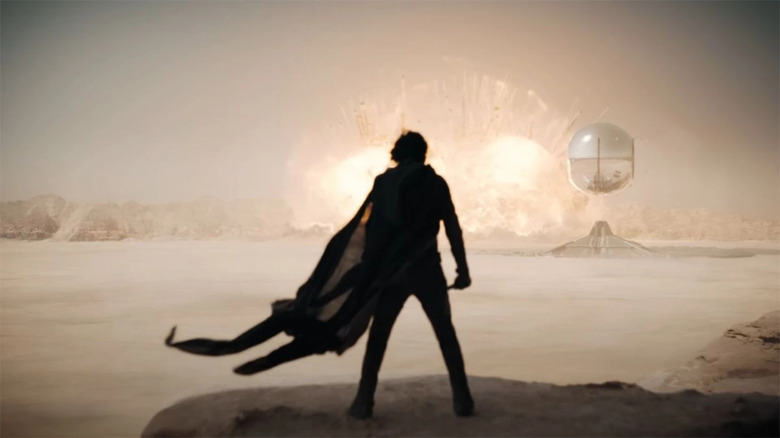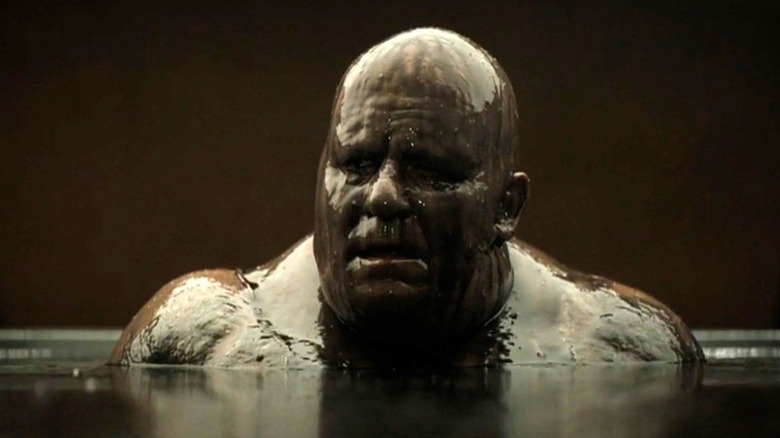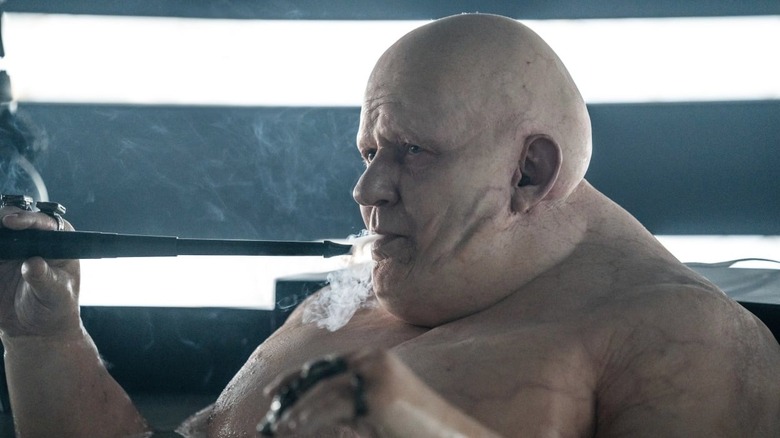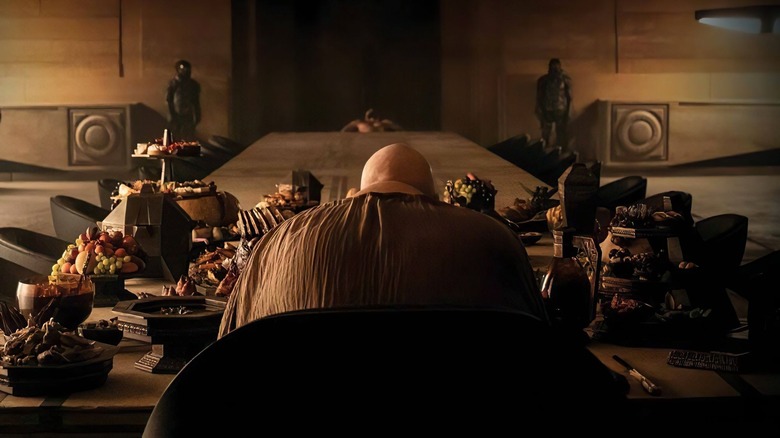How A Major Dune 2 Death Changes From The Book
This post contains spoilers for "Dune: Part 2."
It's been a rough couple of movies for the "Dune" villain Baron Vladimir Harkonnen (Stellan Skarsgård). First, he nearly died from Leto Atreides' poison gas-filled tooth, and now he's been stabbed to death by his own grandson. The poor guy has met his painful demise, all simply because he killed and tortured a bunch of people for decades on end. Not fair! But if it's any consolation for him, the Baron Harkonnen from the books didn't end on a graceful note either. Instead of being killed by his known enemy Paul Atreides (Timothée Chalamet), the book version of Baron was slain by a hyper-intelligent knife-wielding toddler.
In order to explain this, we must first explain the movie's other major departure from its source material. Whereas the movie version of Jessica (Rebecca Ferguson) stays pregnant throughout the entire runtime, talking with her fetus as she goes about brainwashing the Fremen, the book's version of Jessica gives birth within the novel, and we're treated to a few hundred pages where her daughter Alia roams about. In the book, Alia isn't exactly a villain, but she's certainly creepy; she was exposed to the Water of Life while she was still a Fremen, which has made her supernaturally wise and cunning from way too early an age. She also holds the memories of all her ancestors, so she has thousands of years of experience to draw upon.
Despite all this, Alia's still a strong ally to our main characters. She fights alongside them against the Harkonnens, and when she gets the chance to avenge her father's death, she takes it. When the Baron grabs her in an attempt to capture her, Alia discreetly stabs him with the Gom Jabbar, the poisoned needle-tip that Bene Gesserit witches have been shown to use during the pain box tests with Paul and Feyd-Rautha.
How the movie handles it
Because Alia's still busy in the womb throughout the movie, it's Paul, having learned about his true lineage, who has to deliver the killing blow. During the attack on Arrakeen, Paul storms into the room where the Emperor and the Harkonnens are meeting, and he fatally stabs the Baron. "Grandfather," he says, "You die like an animal." It's a cold moment, in part because it doesn't even seem like the Baron knows he was Paul's grandfather in the first place. He's given this groundbreaking bit of information, and then he has about five seconds to make peace with it before the life leaves his eyes. It's still more time than Alia gave him, because in the books, her Gom Jabbar kills him almost instantly.
Adding more indignity to the Harkonnen's movie death is the way the Emperor turned on him before Paul stormed in. The Emperor signaled to one of his Sardaukar guards to break the Baron's flotation device, as well as the breathing tank he was hooked up to. Even if his grandson hadn't killed him, it doesn't seem like things were on the up and up for the Baron anyway. In some ways, this makes his death a little more merciful than the book's version: when book Alia suddenly killed him, the Baron's political prospects weren't quite as bleak.
It's not too surprising that the movie changed up the Baron's death, as his death scene was nowhere near as memorable as the deaths of Leto or Feyd-Rautha of Jamis. As cool and sudden as Alia's killing of the Baron was, it was still somewhat anti-climactic for such a built-up character. Book fans don't have any huge attachment to the way this scene went down, so it's not a huge deal for Denis Villeneuve to tinker around with it.
The book's other changes to the character
What also makes this change more forgivable for book fans is that the movies already changed the character a lot anyway. The book's Baron was loud and bombastic, whereas Denis Villeneuve's take on Baron is fairly quiet and cunning. In the book he's a straightforwardly cackling, diabolical villain, whereas in the movies there's more emphasis placed on how gross and off-putting he is. There's a scene in the first movie that features the Baron chewing his food way too loudly, in a way that seems designed to be as nauseating and annoying as possible. The character isn't just meant to illicit fear in the viewer, but disgust.
Which version is more effective? As far as the actor Stellan Skarsgård is concerned, it's definitely his version. "[Baron Harkonnen], as he is in the book, was useless to me, because he talks a lot," he said in a recent interview, "And you don't want a talker, you want someone who's threatening and silent and very dangerous. So having played him like he was in the book would have defied the purpose."
Removing some more problematic aspects
The smartest change overall was not with the Baron' death scene, but with the decision to cut the book's references to the Baron's sexuality. The book includes some homophobic overtones, shown most clearly with the way the Baron embodied the queer-coded villain archetype. There's been a lot of debate among fans over the years if the Baron's meant to just be gay or meant to be a pedophile — he's repeatedly shown to be interested in young males, with the exact age range of "young" not made clear — but the answer seems to be that Frank Herbert, a homophobic man from the '60s who never accepted his own gay son, didn't think there was much of a difference.
Herbert's views on homosexuality did appear to evolve over the decades: in his 1981 book "God Emperor," which was strangely parodied on Cartoon Network, homosexuality was depicted less as a sign of evil and more as a personal weakness/form of masochism, which we suppose is a step in the right direction. It's not clear if Herbert would've portrayed the Baron's sexual proclivities the same way if he'd written him later in his life, nor is it clear just how much of this was intended as direct commentary on homosexuality; it just seems like a smart choice for Villeneuve to cut the aspect entirely. The Baron was a weird creep in all sorts of ways, and he died a deserved death on both the page and the screen; Villeneuve didn't need to throw in any hints at his sex life to make any of that clear.



